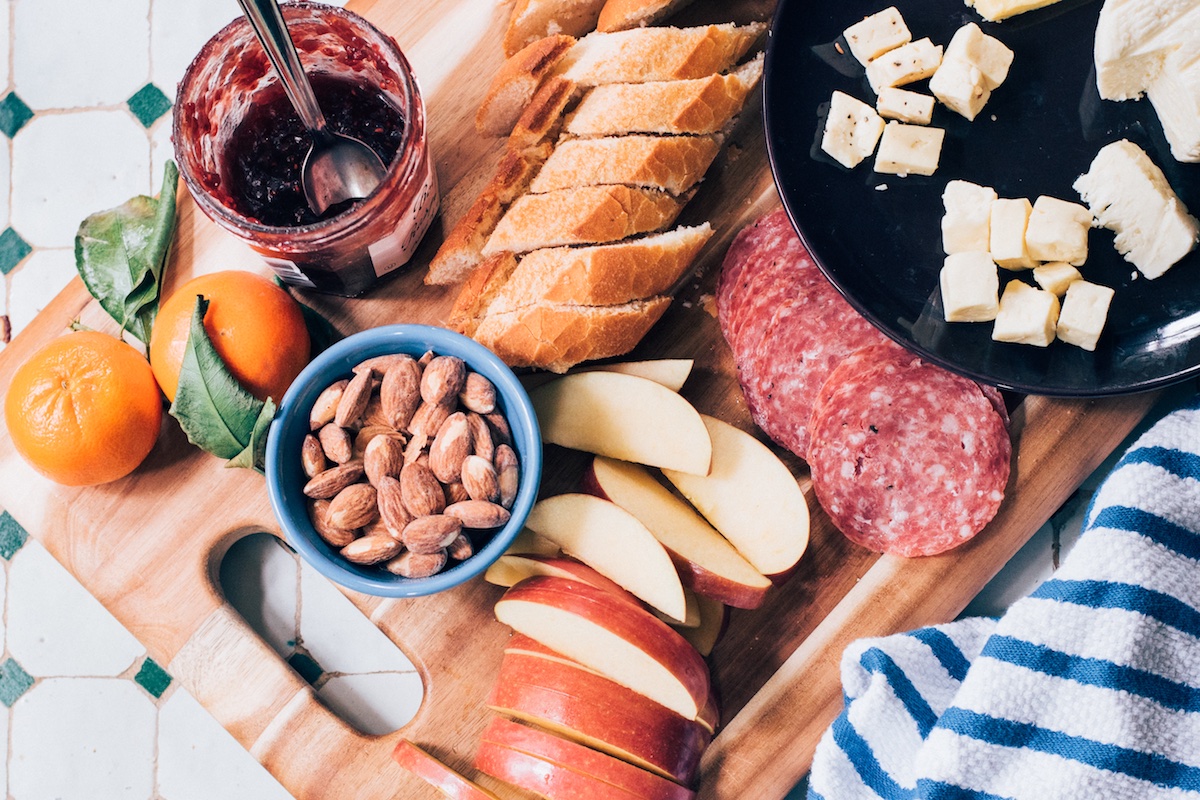Dr. Mark Hyman is a practicing family physician, medical advisor for Bill and Hillary Clinton, and a #1 New York Times bestselling author of multiple books on nutrition and wellness, including Eat Fat, Get Thin and The Blood Sugar Solution. Chris Kresser, M.S., L.Ac is a globally recognized leader in the fields of ancestral health, Paleo nutrition, and functional and integrative medicine, and is the author of the New York Times best seller, Your Personal Paleo Code. The two recently sat down to discuss what vegetarians may be missing from their diet and why eating real, simple food matters.
Mark: You and I have a lot of friends and colleagues who are vegan and really believe in this lifestyle. What do you say in terms of the nutritional benefits or the potential nutritional harm from being a vegan [or] vegetarian?
Chris: First of all, I’m a pretty hands-off guy. If someone’s a vegan and they’re my friend, I’m not going to say anything to them about their diet. If it’s working for you, great. There are many reasons people make the dietary choices they do. When I was an macrobiotic vegan, I wouldn’t have appreciated somebody beating me over the head and trying to get me to follow a paleo type of diet.
Let’s say someone comes to me, and it’s a woman who wants to get pregnant. She’s been on a vegan diet, and she asks me, “Should I continue with my vegan diet? I’m considering eating meat.” I will say something like, “Some people can do okay with a vegetarian diet. Fewer people, in my opinion, do well with a long-term vegan diet.”
Mark: If you’re eating eggs and dairy, you’re better off than if you’re just totally vegan.
Chris: Yes, because eggs and dairy have a lot of nutrients like Vitamin A and choline and things that are hard to get.
This is something that I don’t think a lot of people understand. The plants have the precursor nutrients. Those precursor nutrients like beta-Carotene or Vitamin K1 need to be converted into the active forms, so in the case of beta-Carotene, that would be retinal. In the case of K1, that would be K2, to have the full benefit that they have in our bodies. Some people make those conversions pretty well. Many people don’t make them well. Some people don’t make them at all. If you’ve ever seen someone who’s done a juice fast with carrots and their skin turns kind of orange, that’s someone who doesn’t convert beta-Carotene into retinal.
Then we take someone like Rich Roll, who is a just phenomenal triathlete. He’s been on a vegan diet for a long time.
Mark: He did five Iron Mans in seven days.
Chris: It’s obviously working for him. He supplements as far as I know, and understands how to do that well. He is an exception.
Mark: He does a tremendous amount of exercise, which actually helps with protein synthesis.
Chris: He’s not the typical person. We know from the research that a lot of nutrient deficiencies are more common on vegetarian and vegan diets. Earlier studies found that there wasn’t a big difference in serum B-12 levels between vegetarians/vegans and omnivores, but using more sensitive markers like methylmalonicacid and homocystine, you see big differences between [them]. On average, plant-based diets have a greater risk of leading to deficiencies of essential nutrients.
Trending: Best Happiness Books of 2025 (So Far)
Mark: Over 20 years, I’ve tested tens of thousands of patients on nutritional levels. The nutritional deficiencies in Americans at large, and particularly vegans, are stunning to me. You see dramatically low levels of iron, Vitamin A, Vitamin K, Omega-3 fats, Vitamin D, and B-12. Their health is affected by it.
Let’s also talk about protein. Are animal protein and plant protein equivalent? Is there a difference in the ability to synthesize muscle from plant versus animal [protein]?
“On average, plant-based diets have a greater risk of leading to deficiencies of essential nutrients.”
Chris: One of the most important roles that animal protein plays is [its] greater ability to build and maintain muscle mass. Animal protein is consistently associated with better bone health, lower risk of falls, greater muscle mass, [and] as a consequence, better overall health in everybody, but especially in the elderly. It becomes even more important as we age, because as we age, our muscle mass tends to decline.
Of course, we can combat that by exercising and weightlifting as we get older, which helps to build muscle mass. Animal protein has an anabolic effect, an ability to build muscle, that plant protein doesn’t have.
Mark: That’s a big difference, right?
Chris: Huge.
Mark: Vegetarians [say,] “If you eat beans and rice and broccoli, you’re going to get plenty of protein.” That’s a big myth. When I put people on grass-fed whey protein, it dramatically increases muscle synthesis. It’s got a high level of glycine, a specific amino acid that metabolizes. You have to eat six cups of quinoa to get the equivalent of a four-ounce piece of meat.
Chris: If there’s one thing that bodybuilders know a little bit about, it’s how to build muscle. Whey protein has been the staple, or any other kind of animal protein.
Mark: I want to start talking about carbs for a minute. It’s easy for people to go extreme. Say, “All sugar is bad and carbs are bad,” or, “All fat is bad,” or, “All fat is good, so we should be eating all fat.” Those extremes are probably not what most of us should be doing. There’s a variety of humans out there. Some people don’t do as well with a lower carb diet. What have you found working with patients and in literature around people eating different amounts of carbs?
Chris: Where I’ve landed is that there’s no “one size fits all” approach. It’s very difficult to give one recommendation that would be suitable for everyone. This is why I called my book, when I first published it, Your Personal Paleo Code. Look, there are certain foods that nobody thrives on, pizza being one of them. Processed and refined flour, sugar, industrial seed oils, all these processed foods, we can just throw those out, because there’s not one individual out there that’s going to do really well on those foods. There are some basic assumptions we can make that apply to everybody.
Beyond that, within that template of a nutrient-dense, Whole Foods diet, there’s a lot of room for flexibility and variation depending on individual needs. Let’s take someone who’s 60 pounds overweight, primarily sedentary, office job, pre-diabetic. They’ve got a family history of heart disease and diabetes, and their main goal is to lose weight and improve their metabolic health.
Then, let’s take a lean woman who has three children. She is working full time. She’s getting about five hours of sleep a night and has an enormous stress level and is doing CrossFit three or four times a week. Should those two people have the same diet? Should they have the same fat and carbohydrate intake?
Mark: Probably not. One’s a therapeutic diet. One would be a maintenance diet, right?
“The quality of the foods we’re eating and their nutrient density is by far the most important factor.”
Chris: Right. In the case of the person who’s overweight, I would argue that a low carb diet, at least initially, might be a really good choice for that person. It’s going to help them lose weight quickly. Increasing their protein intake will increase their satiety and help them stick with their diet. It might improve their lipid profiles. They’ll probably see a decrease in their LDL, an increase in their HDL, and a decrease in triglycerides and all kinds of other risk factors.
Then if you put that working mother who’s stressed out and burning the candle at both ends on a very low carb diet…
Mark: She’s going to wipe out.
Chris: She’s going to crash in the afternoon. She’s going to start having insomnia. She might become amenorrheic. She might start to have mood disorder or anxiety. Nine times out of ten, when I have that person, that mom adds more real food carbs.
Mark: Like what?
Trending: Why Rest is the Biggest Productivity Hack for Your Brain
Chris: Not flour, not sugar, not muffins at Starbucks.
Mark: Brown rice? Pasta?
Chris: No. Sweet potatoes, even white potatoes, particularly if they’re cooked and cooled, and they form resistive starch. The small red potatoes. Then some of the less commonly eaten starches, like plantain or taro or yucca. There are a lot of different options out there. Pumpkins, capacious squashes, the dense squashes and whole fruit. Those are excellent carbohydrate choices for someone like that. They do not impact blood sugar in the way that Cheese Doodles do. You can’t compare those kind of carbohydrates with Big Gulps and pizzas.
Mark: Where are the grains and beans and all?
Chris: This is where I differ from other paleo advocates. I do think that whole grains and legumes, if they’re well tolerated, and if they’re properly prepared, can play a role in a healthy diet. [But] when you look at the nutrient density of grains and legumes compared to the foods that I just mentioned, it’s lower.
Mark: I came up with this idea of a pegan diet as a joke. Then it turned out, that’s exactly what you’re talking about: small amounts of these other foods. It’s very open and inclusive, but it focuses on concepts of very low glycemic diets.
Chris: Nutrient density, yeah.
Mark: Nutrient density, lots of plant foods, grass-fed meat, lots of nuts and seeds, no processed food, no antibiotics, no hormones and no crap in your diet. These are just common sense principles.
“When you eat nutrient-dense food, you don’t have all these cravings. You can get your body back.”
Chris: Common sense things, what we’ve been eating for millennia. The grains and legumes are more recent, but we have been eating them for at least ten-thousand years, and many research reports now suggest much earlier than that.
Mark: We ate them differently, too. I just came back from Utah. We went on these ancient grounds of the Indians who lived there a thousand years ago. We found they had a stone and a little rock and then [another] stone. It’s how they ground their grain. You had to grind your grain with a stone and another stone.
Chris: That’s a lot different than eating a baguette.
Here’s the other thing: we know that the plants, grains, and legumes that our ancestors ate were probably very different in their sugar content. Jo Robinson says one of the biggest differences between our modern diet and our traditional diet has been the cultivation of plants to make them sweeter over time. Original corn was not sweet. Now it’s almost candy.
Mark: I had some last night. It was like sugar. We’ve taken the dwarf wheat, which used to be Einkorn traditional wheat, and it’s now got huge amounts of super starch in it, which is worse than table sugar.
Chris: I had a gluten-intolerant patient who was over in Europe. She ate wheat there.
Trending: How to Break Free From the Ambition Trap
Mark: They don’t allow [dwarf] wheat.
Chris: They don’t have any problem.
We can get a little too focused on the details and lose sight of the most important thing, which is the quality of food we’re eating. Not the quantity of fat or the quantity of carbohydrate or even necessarily the quantity of protein. The quality of the foods we’re eating and their nutrient density is by far the most important factor.
Mark: Yeah, quality matters. People who are obese are often malnourished, and they’re trying to eat more to get the nutrients that they’re missing. When you eat nutrient-dense food, you don’t have all these cravings. You don’t feel hungry all the time. Your brain can turn off. You can get your body back.
Chris: This is why it works so well for weight loss. You’re maximizing nutrient density. You’re minimizing calorie density. High-protein foods don’t tend to be very calorie-dense. Non-starchy vegetables are nutrient-dense but not calorie-dense. Even starches like sweet potatoes are nutrient-dense and not particularly calorie-dense.
Mark: Fat is pretty calorie-dense, but it also works differently.
Chris: It has key nutrients that are hard to get in other foods. Fat isn’t nutrient-dense compared to beef liver, for example, but it is rich in things that we need and that aren’t found in other foods. It’s also a great source of energy for the body.
Mark: I get emails all the time from friends and colleagues who are [looking for] a doctor. The truth is, when people do this approach, they often don’t need to go see a doctor.
Chris: Absolutely. After getting my dietary guidelines, a lot of times people show up [for an appointment at my office,] and they’re like “Uh…”
Mark: “I’m better.”
Chris: Yeah. It’s amazing what diet and lifestyle change alone can do.
This conversation has been edited and condensed.



























